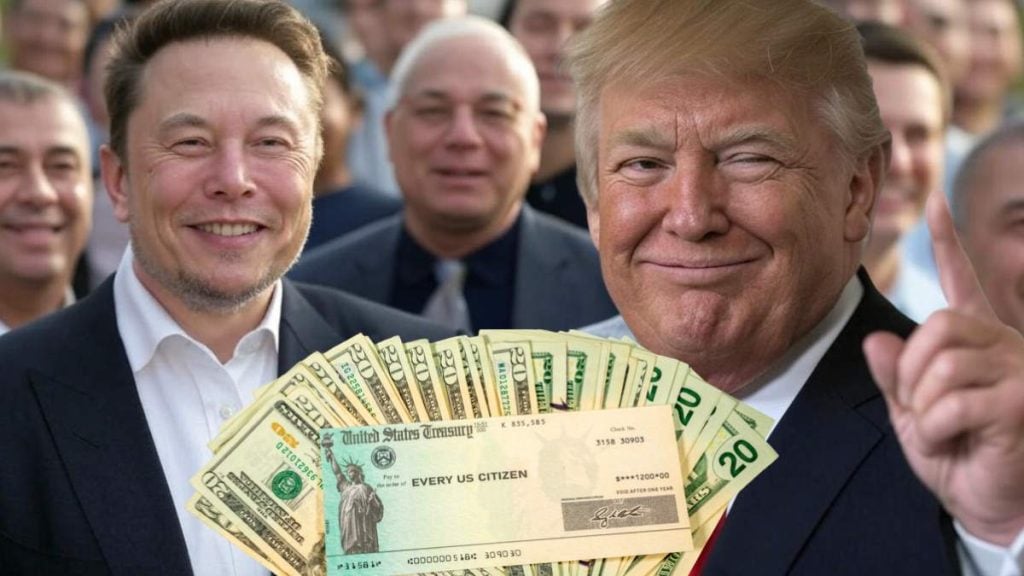100 days into Donald Trump’s second term, his economic promises—from tax breaks to stimulus checks—are sparking debates about their viability and impact. Initiatives include the elimination of the federal overtime tax, a possible DOGE Dividend and measures to reduce inflation, issues that face legislative and technical challenges.
According to official documents, the budget resolution approved by Congress contemplates cuts of 2 trillion dollars and tax exemptions of 4.5 trillion. This framework would allow progress on proposals such as the elimination of the overtime tax, although it would not affect state taxes. However, experts warn that its implementation will depend on negotiations during the legislative reconciliation process.
Doge dividends and tax cuts: are these proposals finally going to happen?
Promise to eliminate tip and overtime tax faces skepticism. While Republicans hope to approve the project before Memorial Day, analysts recall that similar initiatives in the past collided with budget limits. Additionally, the proposal would exclude workers who receive more tax credits than they pay, according to data from the Tax Foundation.
Regarding the DOGE Dividend, an idea initially suggested by investor James Fishback, there is still no concrete project. Although Elon Musk and Donald Trump have mentioned the possibility of stimulus checks, the proposed figure was reduced from $2 trillion to $150 billion. Fishback suggests that only households with positive net taxes would receive the benefit, leaving out 50% of low-income taxpayers.
Who qualifies for the DOGE stimulus check and who does not
Trump promised to reduce inflation “from day one,” and although the rate fell from 3% in January to 2.4% in March, products such as eggs rose 26% in the same period due to outbreaks of bird flu. The Bureau of Labor Statistics reports that, although fruits and vegetables have become cheaper, processed foods remain high.
A report from the Pew Research Center confirms that those who earn less than $40,000 annually tend to get more credits than their tax obligations. This would limit the scope of the dividend, generating criticism for its possible regressive effect. “It is a redistribution, but not for everyone,” said an anonymous analyst consulted by this medium.
The possible DOGE Dividend reignites the debate about the impact of injecting liquidity. CouponSnake’s Aaron Razon warns: “A one-time stimulus would increase demand and put pressure on prices.” Joseph Camberato of National Business Capital agrees: “We saw the effect in the pandemic. Although minor, there would be risks.” Fishback, on the other hand, argues that taxpayers would allocate the money to savings or debt, not immediate spending.
In the face of uncertainty, Thrivin Life’s Lucas Barcelo suggests the Trump administration needs “early victories” to gain support. However, Camberato is skeptical: “With the current deficit, giving money away makes no financial sense.” Experts agree that, beyond the promises, citizens must prioritize savings and debt reduction.
What we know so far, and to the surprise of few, is that the DOGE dividend stimulus checks have little chance of becoming something concrete in the coming weeks, especially with the uncertainty of Elon Musk’s continuity in the DOGE Department: the South African businessman has said that he is thinking about leaving the Trump government ship and returning fully to Tesla and SpaceX.
What have been the effects of past stimulus checks?
The 2020-2021 COVID-19 stimulus checks generated increases of up to 9% in durable goods prices, according to the Federal Reserve. Razon warns that repeating stimuli, even on a smaller scale, could reactivate inflationary pressures: “It is a lesson learned: injecting money has mixed effects.”
On the other hand, defenders of the DOGE Dividend argue that, by targeting net contributors, “excess” liquidity would be avoided. Fishback insists that these households have greater investment capacity, but Barcelo counters: “There are no guarantees. Without financial education, money could be wasted.”
